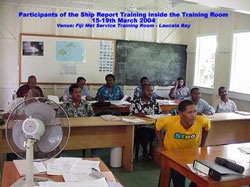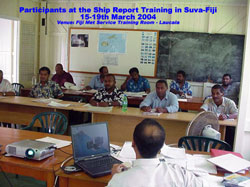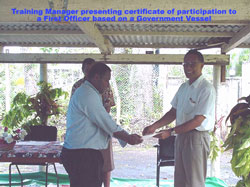
Marine Observation (Ships Report Code) Training
Tan Singh, Training Officer, Fiji Meteorological ServiceIntroduction
 |
The course was the first of its kind to be conducted in Fiji. It was conducted at the Laucala Bay Weather Office from 15th to 19th March 2004 in response to a request made by the Government Shipping Services (GSS) of the Ministry of Transport and Civil Aviation of the Republic Of Fiji Islands. There were 12 participants who were all seamen from within the Government Shipping Services.
Objectives
The training was focused on developing the knowledge of the participants on the symbolic form of the International Code of the ships report and its importance to the Fiji Meteorological Service (FMS).
It also aimed at up-skilling the participants on the operation of the meteorological instruments, the construction of the actual reports, and their transmission to the National Weather Forecasting Centre in Nadi, Fiji Islands.
Methodology and Strategies
 |
The four-day course was divided into theoretical and practical sessions. The strategy adopted was power-point presentations that focused on the symbolic form of the ship report and the various types of weather elements that make up the report.
Practical sessions were also very much part of the training as the participants were exposed to the use of the standard observational instruments that are routinely used by the Meteorological Service for hourly reports and synoptic purposes. Identification of instrument faults and basic maintenance procedures were also taught.
There were also discussions held on the methods of transmitting the reports to the National Weather Forecasting Centre of the Fiji Meteorological Service during which it was suggested that the reports are communicated directly to Forecasting Centre through radio telephone.
Outcomes
 |
The training presented an opportunity for the participants to understand the need to provide more and complete ship reports from within the Fiji waters. The need to broaden the network of ships reporting was also noted.
The training also gave the participants an opportunity to understand the importance of providing accurate and timely reports and to appreciate FMS utilization of the reports for forecasting purposes.
The successful completion of the training has provided credit to their careers.
Evaluation
Overall, the training was very successful in identifying the needs of FMS and GSS in terms of preparing ships reports. It was well organized and structured, but given its complexity and importance it was felt that it should be allocated more time in future training. Although the venue was thought to be the best for similar training in future, the classroom condition and furniture were considered below standard.
Recommendations
- Installation of weather observational instruments on the government ships to proceed as soon as possible. This will allow trained personnel to do proper reports.
- Future training on the same topic to be extended to two weeks so that the syllabus can be thoroughly covered.
- Participation in future training to be extended to other seamen in Fiji who have not gone through the same training.
- The training room at Laucala Bay to be provided with the following: air-conditioning, white board, proper desks and chairs, curtains, and the room to be connected to the FMS local area network.
Special thanks to Robert A. Luke of NOAA Mariners Weather Log for providing assistance in sending to the Fiji Islands, The International Ship Report Codes, Cloud Charts, Video Tape on Ship Reports, and Beaufort Scale in electronic format. These materials were very useful during the course.
Page last modified: